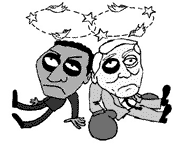BAD NEWS travels fast. It also travels a really long way.
So I’m sitting on the back deck of a house in the woods of coastal Maine, watching a summer day turn to dusk, while my sweetie’s brother gets ready to drop a dozen fresh lobsters into a boiling pot for dinner. I’m midvacation; life is good. And then said sweetie hands me page A2 of The Boston Globe, with Paul Schell’s bruised face staring out and an accompanying story in which every individual quoted is someone I know.
This is getting to be much too small a world.
In the ensuing media circus, a few things have been left out. Primarily, this is because of Omari Tahir-Garrett, the alleged assailant, who denies walloping Hizzoner with a megaphone even though a lot of witnesses (including the folks I know and talked with) say he did. But I’ve also been encountering Omari himself for many years, which definitely colors any analysis of the ensuing frenzy.
So, first, about Omari: It’s ironic that this incident, which by just about every account shows him at his worst, is the avenue by which reporters are finally diligently copying down Omari’s rantings. Because for many, many years, Omari has ranted; he is a unique combination of intelligent, articulate, visionary, paranoid, angry, and, more than occasionally, off the deep end. He seems to me to be about equal parts speaker of uncomfortable truths and speaker of demonstrable nonsense—and one should not detract from, or excuse, the other. For the past several years, he has made the establishment of an African-American Heritage Museum his personal obsession: Community activists have tried since 1987 to get it going; in recent years, the effort—which Omari has been part of since the beginning—has been taken over by more politically powerful, and less community-based, interests that seem more interested in neighborhood development and gentrification (they’re for it) than an ethnic community center modeled on El Centro de la Raza or Daybreak Star. This has pissed Omari off.
But so have many other things over the years, and he has often found himself either alone in a righteous struggle or alone in a hopeless cause—or both. He’s often angry, often bitter, and has also done more to walk the talk than any 12 of the sycophants surrounding Paul Schell on the fateful day when he came to the C.D. to dance on the grave of Aaron Roberts.
Ultimately this, not Omari Tahir-Garrett, is the issue that matters. All of the City Hall spinning and media harrumphing can’t avoid the incident’s underlying message: Why was it that, fully six weeks after Roberts’ death, Schell felt the need to come down to the site to attend what local witnesses describe as a primarily white, developer-oriented event; and why was it that other area residents showed up to vent their anger at Schell’s insensitive platitudes?
As far out on the political landscape as Omari Tahir-Garrett travels, I guarantee you that a fair number of people in my neighborhood cringed when they saw the image of Schell with a black eye, because they immediately knew that the coming circus would detract from issues of police and City Hall accountability and, at the same time, reflected that over the years Schell’s actions have hurt far more people than have Omari Tahir-Garrett’s.







